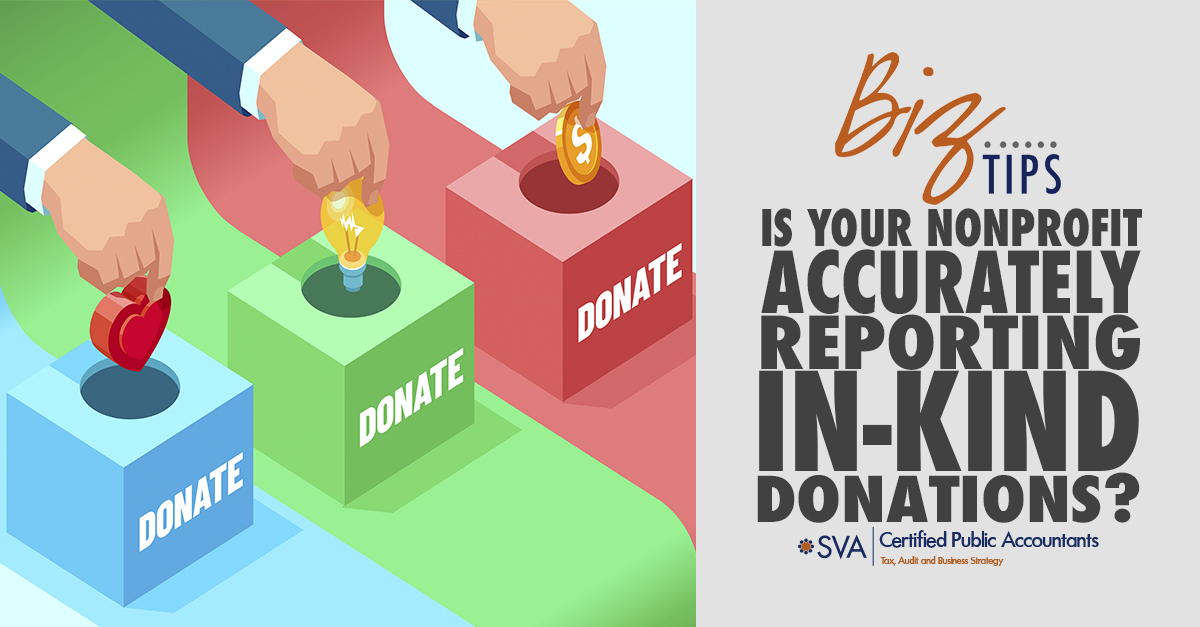In-kind donations, also known as gifts in kind, are donations of services, goods or time. They can include physical goods, such as clothing, equipment or supplies, as well as immaterial items like royalties, copyrights, advertising or patents. In terms of in-kind services, they could include professional support from colleges, tradespeople, vendors or corporations.
As you may know, the defining characteristic of gifts in kind is that they are noncash donations from people or groups who are looking to support your nonprofit’s mission in nonfiscal ways. Generally, nonprofits will utilize in-kind donations of goods and services to offset the cost of events or to expand their offerings for auctions and other fundraisers.
However, when reporting financial statements based on generally accepted accounting principles (GAAP), it is critical for nonprofits to accurately capture and identify all gifts in kind. Reporting in-kind donations is required by auditors, and may also be a requirement of your nonprofit’s set terms and conditions by key constituents, lenders and grantors. If your nonprofit only files a Form 990 and does not undergo annual audits, in-kind donations can be excluded from the form, but should still be properly recorded for internal purposes and accurate bookkeeping.
How Do I Know if a Donation Constitutes a Gift in Kind?
When reporting the in-kind donations your nonprofit has received, it may not always be clear whether a perceived good or service actually constitutes a gift in kind. This is because goods can take on a variety of forms, such as:
- Goods and use of property for resale, such as a rental unit
- Items to be used specifically for auctions or other special events
- Office furniture, supplies and equipment
- Technology software and hardware
- Discounted or free use of facilities
- Financial securities that can be converted into cash or traded
Since the types of gifts in kind vary, it is important to have a policy in place that will allow your staff members to know which gifts can be accepted. If a gift in kind is received and your staff is unsure how to proceed, chances are that the gift should be further evaluated to determine how it should be accurately reported. It may be worthwhile to consider whether the gift is useful for the organization, as some donations may be more work than they are worth.
Additionally, GAAP requires nonprofits to report the fair value of donated services if the services demonstrate either of the following:
- The service enhances or creates a nonfinancial asset.
- The service required an individual or entity with specialized skills and would have been purchased had it not been donated.
How Should I Report Gifts in Kind?
Nonprofits typically apply the Financial Accounting Standards Board’s (FASB) fair value measurement standard to gifts in kind. FASB defines fair value as “the price that would be received to sell an asset or paid to transfer a liability in an orderly transaction between market participants at the measurement rate.
However, since nonprofits do not receive the goods as a market participant, most organizations will calculate the fair value based on a wholesale exit market. Service providers and general contractors can also provide their fair value rates based on their usual market prices with other customers. If the gift in kind lacks a realistic valuation, such as a sculpture or historical item, auditors may ask for an independent appraisal if the value of the item surpasses $5,000.
For auctioned goods, the fair value will adjust based on the sale of the highest bidder. If the donated gift in-kind and sale occur in the same fiscal year, nonprofits should report the final valuation in their financial records.
Although nonprofits may not have market experience when valuing their in-kind donations, assessing the gifts’ characteristics can help determine how to most accurately report the goods or services in their financial statements.

© 2019 CPAContentPlus

